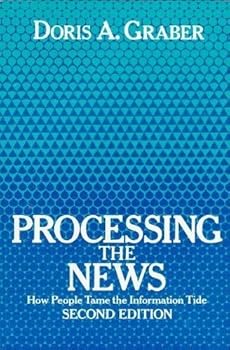Processing the News: How People Tame the Information Tide
Select Format
Select Condition 
Book Overview
This work assesses the political consequences of news presented to the public and how the public processes the news. Based on monitoring of 16 adults and the news content that reached them, it focuses... This description may be from another edition of this product.
Format:Paperback
Language:English
ISBN:0801300479
ISBN13:9780801300479
Release Date:January 1988
Publisher:Longman Publishing Group
Length:300 Pages
Weight:1.20 lbs.
Customer Reviews
1 rating
How people use media information: A success story
Published by Thriftbooks.com User , 15 years ago
Doris Graber's work on political communication has been a major contribution to political science. In this book, she uses an interview method to get at several key questions, such as: What parts of media information arouses people's attention? What is ignored? How do Americans make decisions using media information? Graber uses an interview technique to ascertain people's use of political information. Groups are defined in terms of (a) level of interest in politics (high, low) and (b) access to media information (easy or not so easy) (a chart on page 12 illustrates). Among subjects considered in the various chapters: information supply; selecting news to process and, perhaps, to store; learning from information; processing information; developing categories. In the end, her results are hopeful. As she puts it (pages 215-216): ". . .the findings presented in this study confirm that average Americans can successfully scrutinize the merits of people and policies from a variety of perspectives. . .Average people know how to accept and reject information, and they are, therefore, not likely to be manipulated into large-scale acceptance of schemas that conflict with the basic tenets of American culture." And the results are hopeful indeed. . .






